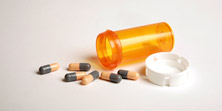Health Blog: Solutions & Wellness Tips
Medication Risks and Prescription Drug Abuse

We felt compelled to share this reminder because so many of our patients are on medication when recovering from their movement disorders or surgery.
As you likely know, prescription drugs can do wonders to help people live healthier and longer lives. But not taken as directed, or if someone takes some that don't belong to them, they can create a nightmare, being very dangerous and even deadly. In the United States, prescription drug abuse is a common problem impacting people of all ages and races.
From celebrities, such as Michael Jackson and Heath Ledger, to ordinary people living their lives, prescription drug abuse can wreak havoc. Research has found that 1 in 5 people over the age of 12 has admitted to taking a prescription drug for a nonmedical purpose at some point during their life. It happens for a variety of reasons, including to lose weight, build muscle, or just to get high. But it comes with a serious risk of addiction, as well as a host of health problems that can occur, ranging from breathing problems and personality changes, to irregular heartbeat and seizures. People can also have physical injuries and accidents while under the influence of these drugs.
The three drugs categories that are the most commonly abused include depressants, painkillers, and stimulants. Depressants (e.g., Valium, Ativan, Xanax) are used to treat anxiety, sleep disorders, and panic attacks. Stimulants (e.g., Ritalin, Dexedrine, Adderall) are used to treat attention deficit hyperactivity disorder. Painkillers (e.g., codeine, morphine, Vicodin, OxyContin), such as opioids, when taken as described, are effective and rarely cause addiction. But these can be dangerous when abused or taken with other drugs and often leads to death.
Many high school students today are believed to have abused prescription drugs, with some 10 percent having admitted to using Vicodin during the past year for recreational usage.
It is important to always take prescription drugs as they are directed, by your doctor. If you have prescriptions for the drugs that are commonly abused, maintain control of them so that they do not fall into the hands of others who may be looking to use them. Avoid leaving them in a bathroom medicine cabinet where your guests frequent. This puts them right where they may be tempting to those who look into your cabinet.
April 5, 2013
Back to Health BlogRECENT POSTS
- Avoid Surgery and Talk to a Physical Therapist About Foot Problems
- A Personalized Physical Therapy Program Can Assist with Whiplash
- Why Older Adults Should Incorporate an Exercise Program
- After an Achilles Injury, Physical Therapists Can Help with Recovery
- AI Can Answer Questions But It’s Best to See a Physical Therapist
- Physical Therapy Can Help With Symptoms of Wryneck
- Reduce the Risk of Pickleball Fractures By Taking Proper Precautions
- Physical Activity May Slow the Progression of Parkinson's Disease
- Too Much Salt in Your Diet? Learn the Dangers of High Sodium Intake
- Suffer From Lower Back Pain? Might Be Time to Take A Break

